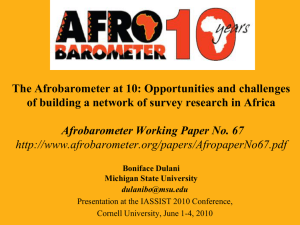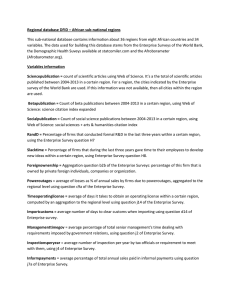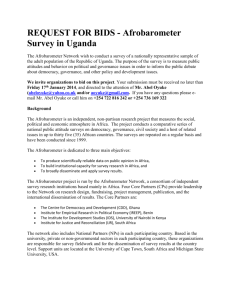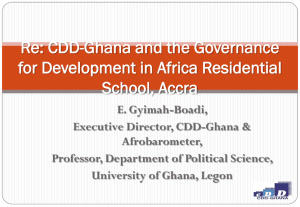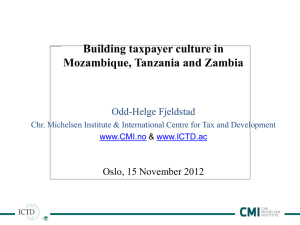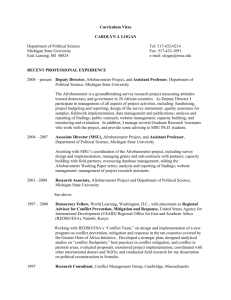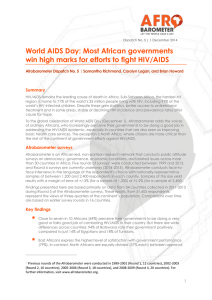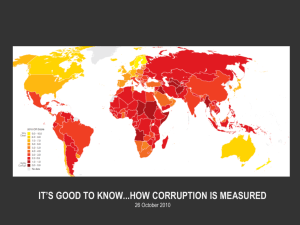Partnership of free speech and good governance in Africa (Nairobi
advertisement
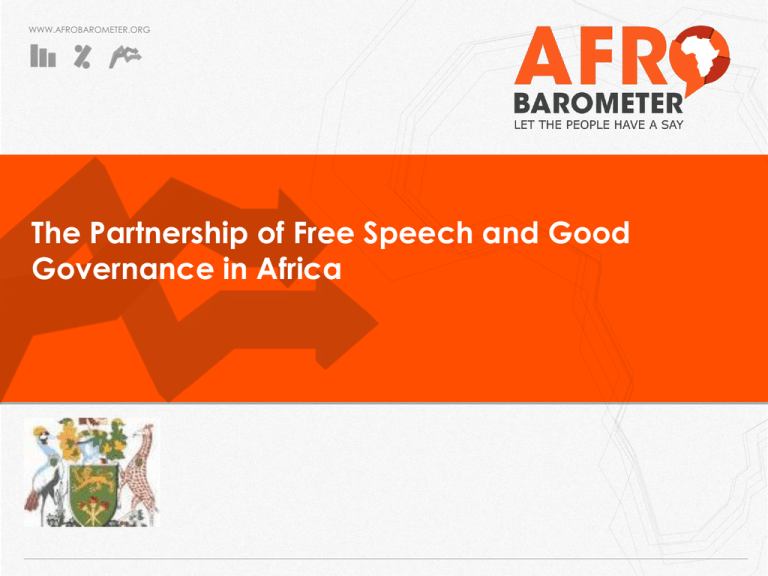
WWW.AFROBAROMETER.ORG The Partnership of Free Speech and Good Governance in Africa What is the Afrobarometer? The Afrobarometer (AB) is a comparative series of public opinion surveys that measure public attitudes toward democracy, governance, the economy, leadership, identity, and other related issues. The AB is an independent, non-partisan, African-based network of researchers. The first round of surveys took place in 1999-2001 in 12 countries. The Network is now conducting “Round 5” surveys in up to 35 countries during 2011-2013. Purpose: To measure popular perspectives on the social, political, and economic environments in each country where it is implemented and across Africa. Goal: To give the public a voice in policy making processes by providing high-quality public opinion data to policy-makers, policy advocates and civil society organizations, academics, media, donors and investors, and ordinary Africans. WWW.AFROBAROMETER.ORG 2 Country Coverage: 1999-2013 Round 1, 1999-2001, 12 countries • Southern Africa: Botswana, Lesotho, Malawi, Namibia, South Africa, Zambia, Zimbabwe • West Africa: Ghana, Mali, Nigeria • East Africa: Tanzania, Uganda Round 2, 2002-2003, 16 countries • Cape Verde, Kenya, Mozambique, Senegal Round 3, 2005-2006, 18 countries • Benin, Madagascar Round 4, 2008-2009, 20 countries • Burkina Faso, Liberia Round 5, 2011-2013, up to 35 countries • Algeria, Burundi, Cameroon, Cote d’Ivoire, Egypt, Ethiopia, Guinea, Mauritius, Morocco, Niger, Togo, Tunisia, Sierra Leone, Sudan, Swaziland WWW.AFROBAROMETER.ORG 3 Who is Afrobarometer A Pan-African Network of survey researchers and analysts. • In each country there is a National Partner responsible for survey implementation. • Four Core Partners provide technical assistance and Network management: o o o o • Center for Democratic Development (CDD), Ghana Institute for Justice and Reconciliation (IJR), South Africa Institute for Development Studies (IDS), University of Nairobi, Kenya Institute for Empirical Research in Political Economy (IREEP), Benin Two Support Units for capacity building and quality assurance o Michigan State University o University of Cape Town • Round 5 Core Funders include – DFID – SIDA – USAID – Mo Ibrahim Foundation WWW.AFROBAROMETER.ORG 4 Survey Methodology • Nationally representative sample of adult citizens – all respondents are randomly selected – every adult citizen has an equal and known chance of being selected • Face-to-face interviews in the language of the respondent’s choice • Standard survey instrument across all countries for comparability • These 34-country results therefore represent the views of approximately three-quarters (76%) of the continent’s population with a margin of error of +/-2% at a 95% confidence level. • The total number of respondents in the 34 countries was 51,605. • Results from a 35th country, Ethiopia, will be available shortly. WWW.AFROBAROMETER.ORG 5 Global Dissemination Events • 01 October 2013 - Johannesburg -- Lived poverty and the Economy • 16 October 2013 - Nairobi -- Globalization and the Freedom to Communicate • 30 October 2013 - Accra -- Governance and Resource Management • 13 November 2013 - Dakar -- Corruption and Attitudes toward China • 27 November 2013 - Lagos -- Taxation • 4 December 2013 - Addis Ababa -- Gender • 12 December 2013 - Bamako -- Democracy • WWW.AFROBAROMETER.ORG 6 WWW.AFROBAROMETER.ORG SURVEY FINDINGS Freedom of Speech, 34 countries, 2011 - 2013 • Just half of Africans (49%) across 34 countries say that they are ‘completely free’ to say what they think, while another quarter (26%) say they are at least ‘somewhat free’. Open countries like Malawi, Tanzania and Liberia – where at least threequarters of citizens feel completely free to express themselves – Contrasts sharply with their much more restricted counterparts, including Burkina Faso, Swaziland, Zimbabwe, Cote d’Ivoire, Togo and Sudan, where only about one in four see it this way. Participants were asked: "In this country, how free are you to say what you think?" (% who say completely free) WWW.AFROBAROMETER.ORG 8 WWW.AFROBAROMETER.ORG Demand for media freedom, 34 countries, 2011 - 2013 • Popular demand for media freedom is solid, with 57% endorsing an unfettered right to publish; the proportions range from 52% in West Africa to 72% among East Africans. WWW.AFROBAROMETER.ORG 10 WWW.AFROBAROMETER.ORG Role of media in society • Media to constantly investigate and report government mistakes and corruption – Solid majority (69%) support media role of oversight – Uganda highest 85%), Cape Verde (83%), Mauritius (81%) – Only Algeria and Swaziland failed to win support fro majority (50%) Participants were asked: "Which of these statements is closest to your view? Choose statement 1 or statement 2: Statement 1: The news media should constantly investigate and report on government mistakes and corruption. Statement 2: Too much reporting on negative events, like government mistakes and corruption, only harms the country.“ WWW.AFROBAROMETER.ORG 12 WWW.AFROBAROMETER.ORG Media Effectiveness Generally, citizens give high marks to their national media for effectiveness in revealing government mistakes and corruption; Average of 71% say the media in their country is either ‘somewhat’ or ‘very effective’; But this average masks wide differences, from lows of just 40% in Madagascar and 43% in Zimbabwe, to 80% or more of Malawians and Egyptians. East Africans are much more likely (81%) to rate their media as effective compared to all other regions. Individual freedom of speech and media effectiveness go hand in hand; the two are strongly and positively correlated. Participants were asked: In this country, how effective is the news media in revealing government mistakes and corruption? (% who say ‘somewhat effective’ or ‘very effective’) WWW.AFROBAROMETER.ORG 14 Media Effectiveness cont’d Freedom of speech is also strongly linked to citizens’ ratings of their leaders: greater freedom is associated with higher levels of trust in leaders and lower reported levels of corruption. Freedom of speech is also associated with higher ratings of government performance across all sectors. The relationship is strongest with respect to fighting corruption. WWW.AFROBAROMETER.ORG 15 WWW.AFROBAROMETER.ORG Freedom of speech and media effectiveness, 34 countries, 2011-2013 Individual freedom of speech and media effectiveness go hand in hand; the two are strongly and positively correlated. 17 Freedom of speech and fighting corruption, country level comparisons 34 countries, 2011-2013 Greater freedom of speech is associated with higher levels of trust in leaders and lower reported levels of corruption. 18 WWW.AFROBAROMETER.ORG Access to news from selected sources, by region, 34 countries, 2011-2013 Television has risen slightly as a key source of news for Africans, while newspapers and radio are both down slightly. North Africans use television far more than do people of other regions. Cellular telephone penetration in Africa is both growing and wide spread. An average of 84% of respondents now use cell phones at least occasionally, And in 20 countries tracked since 2008, access has increased substantially compared to just a few years ago. Internet usage, by contrast, has increased only marginally, and from a much lower base; Average of 18% of respondents access internet on at least a monthly basis, But this ranges from nearly twice as many (34%) in North Africa, to less than one in ten (9%) in West Africa. WWW.AFROBAROMETER.ORG 20 Access to news from selected sources, by region, 34 countries, 2011-2013 93 90% 83 80 78 77 75% 61 60% 56 53 52 45% 41 41 32 30% 32 31 25 21 15% 17 16 14 10 0% West Africa East Africa Radio Television Southern Africa Newspaper North Africa Overall Internet Participants were asked:" How often do you get news from each of the following sources?" (% responding ‘a few times a month’, ‘a few times a week’ or ‘every day’) 21 Access to news via selected sources, 16 countries, 2002-2012 90% 80% 86 84 84 81 70% 60% 50% 54 45 44 44 36 36 40% 30% 40 32 20% 10% 0% 2002 2005 Radio 2008 TV 2012 Newspaper Participants were asked:" How often do you get news from each of the following sources?" (% responding ‘a few times a month’, ‘a few times a week’ or ‘every day’) 22 WWW.AFROBAROMETER.ORG Use of mobile phones, 34 countries, 2011-2013 Participants were asked: Do you ever use a mobile phone? (% yes) 24 WWW.AFROBAROMETER.ORG Use of Internet, by region, 34 countries, 2011-2013 45% 34 16 17 West Africa Southern Africa 30% 18 15% 9 Average North Africa East Africa 0% Participants were asked: How often do you use the internet? (% using ‘a few times a month’ or more) 26 WWW.AFROBAROMETER.ORG THANK YOU
